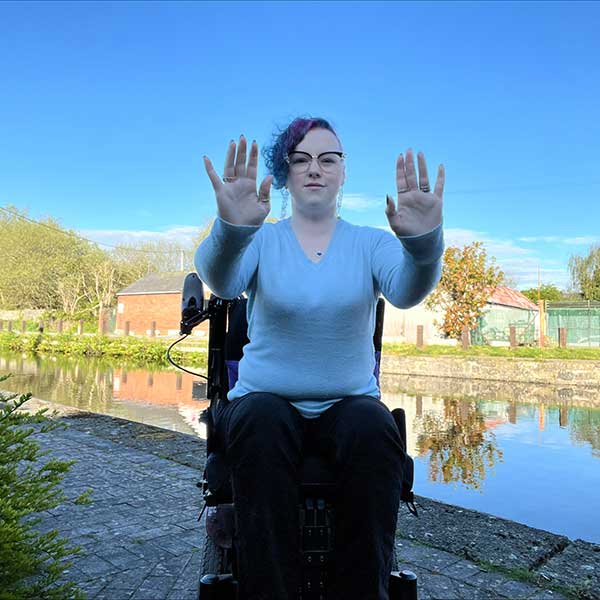"My JIA is a part of who I am.” Why Heather wants to help others with arthritis
02 October 2024
Heather, who lives with JIA, opens up about her journey towards being a volunteer and Tai Chi instructor for Versus Arthritis.
Diagnosis
Heather lives with Juvenile Idiopathic Arthritis (JIA), an inflammation (swelling) of one or more of your joints that occurs in children before their 16th birthday.
Heather first started having symptoms when she was two years old. She remembers being put to bed one night.
“I screamed my head off a couple of hours later,” Heather says. "My parents rushed into the room and it looked like my hips had dislocated.
“I’d gone from being about to walk to not being able to move”, she says. “I’d lost so much mobility so quickly.”
JIA is an autoimmune disease. Your immune system will typically defend your body against injury or illness through inflammation, but when you have JIA it creates inflammation in joints when it doesn't need to. This inflammation causes stiffness and pain and can sometimes affect other parts of the body too.
Surgery
When she was 18, Heather had surgery to try and help with her arthritis, which left her with nerve damage and Complex Regional Pain Syndrome, or CRPS, a condition that causes severe pain which won't go away.
“After the operation I was really depressed”, she says. “I was slightly suicidal, and I isolated myself from anything except my parents and my now husband.”
She found it difficult to adjust to her loss of mobility.
“I’d kind of gone from being able to climb a mountain to barely being able to walk across the road to the local shop, which was quite hard for me and my family.”

“We suddenly had to find out how much wheelchairs cost and how to get them and what equipment to get to support me best.”
Heather’s arthritis means that she can only use more specialised wheelchairs.
“I’ve had to buy from sports wheelchair brands and there’s a huge difference in the price.”
The extra cost means that she ends up using wheelchairs that are unsafe.
“Wheelchairs have a lifespan and after a few years the brakes and tyres go leaving them dangerous to use.
“I don’t have much of a choice at the moment so mine is currently about 5 years past its supposed lifespan.”
Volunteering with Versus Arthritis
Heather, now 26, has been volunteering at a Versus Arthritis support group for about a year now after she was approached by Deborah, the founder of the support group.
“Deb had mentioned she wanted to set up a support group,” she says. “My mum suggested me as I’d been volunteering in a charity shop near us already.”
“The group is going really well. So far, we’ve done a mixture of activities. I’ve taught Tai Chi and arts and crafts, and we’ve had a woman come in and do music.”
Asked what it is she likes most about volunteering, Heather says that “it’s knowing that I’m making a difference.
“I had a friend who quite literally picked me up from the floor and helped me and gave me the courage to keep going. She’s now passed away but knowing that I’m helping people the way she helped me feels like an amazing way to honour her.”
Teaching Tai Chi
As part of her volunteering, Heather was offered an exciting opportunity to be able to teach Tai Chi to her support group.

“I’m not the best when it comes to things like physical activity, but I thought it’d be a great way to help people and to help myself too.”
Tai Chi is a series of slow, fluid movements while focusing on your breathing . It is an accessible exercise that can build balance, mobility, and increases muscle strength.
“I was the first person to do the training who was just doing it seated. The teacher said I’m a bit of an experiment.”
Heather can find the classes tiring.
“I know if I’m doing something like teaching Tai Chi to an in-person group I’m going to be hurting and fatigued the next day. Sometimes it can leave me barely able to move.”
She also teaches online classes which offer more accessibility.
“Of-course it’s still tiring,” she says, “but I don’t feel like I’m going to collapse in a heap afterwards.”
Ultimately though, being in a similar position to her students allows her to be able to “help people who are in the same boat.”
“With Shibashi Tai Chi one of the most important rules is you only do 70% of what you think you can do,” she says, “so I always remind them I know how hard it can be to not overdo it in that kind of class.”
Young people with arthritis
A lot of young people with arthritis don’t get support from people in a similar position to them. Heather wants to change this.

“One of my goals in Versus Arthritis is that I would like to do something specifically for kids with JIA, helping kids or helping people who are my age who have it.
“You want to connect with someone at a more similar age, so you feel not quite as alien.”
She has learnt lots of things that would have been helpful to know when she was younger.
“People who are in the same situation as me,” she says, “who are just starting out and haven’t learnt about wheelchairs, balancing what you want to do with what you actually can do and coping mechanisms yet.
“At the time I felt like I had no control over my life,” she says,” looking back at it I had more then I realised.”
Ultimately, she wants people to be able to accept themselves for who they are.
“I know my JIA has affected my ability to work and my sense of who I am, but also I am who I am because of it.”
We’re here whenever you need us
- If you would like to talk to someone, you can call our free helpline on 0800 5200 520
- Chat to our Arthritis Virtual Assistant
- Join our online community
- Stay in touch and follow us on Twitter/X, Facebook and Instagram
- If you are struggling with your mental health, Mind and Samaritans have helplines which are available 24 hours a day, seven days a week.